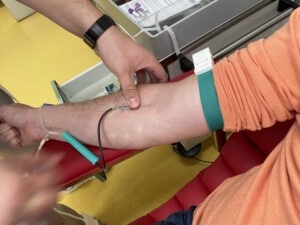
You probably already know that gardening can save you money on groceries, but it also has other great financial benefits. Discover how spending some time in the sun and dirt can save (or even make) you money.
1. Working in the garden can boost your mood.
Outdoor activities like gardening can make you a happier person. According to a 2012 study published in Extreme Physiology & Medicine, outdoor activity in a green environment causes “greater feelings of revitalization and positive engagement.” So if you normally turn to pricey habits to help boost your mood, such as shopping or buying yourself a treat at the coffee shop, try gardening instead. And, like exercise, a regular gardening habit is a great way to maintain a general sense of well-being. In fact, speaking of exercise…
2. Gardening counts as exercise.
Cancel that gym membership, at least for the summer. According to a study of adults aged 60 and older at Karolinska University Hospital in Stockholm, the level of exercise you get while gardening and doing housework is associated with lower risks of heart attack and stroke. Gardening also burns about 272 calories an hour (for a person weighing about 150 pounds), which is more than you’d burn to spend the same hour walking at a moderate pace.
3. You can sell what you produce.
You can sell extra fruits, vegetables, and even flowers from your garden. If it’s appropriate and legal in your community, you can set up a roadside stand, or you can just sell directly to your neighbors. Depending on your area, you might even be able to sell your products to local restaurants and stores – ask to speak to a manager to gauge his or her interest in purchasing local produce.
4. And if you can’t sell your produce, you can barter with it.
Trading produce with your neighbors is an easy way to save money. You might be able to trade your goods for fruits and vegetables that you don’t grow, fresh eggs, or even other products or services. Some businesses get in on the produce-trading game, too. For example, the recent lime shortage has led some bars and restaurants to offer patrons free appetizers or drinks in exchange for limes from their home trees.
5. You can rent out your garden for events.
If you have a well-maintained garden, you can rent it out for events like garden parties. You could also put your space on a short-term rental site like Airbnb and offer the garden as an area to camp or simply as a perk of staying in your home.
6. Gardening can help you meet people.
If you want to meet more people in your area, it might feel like you have to go to bars or other locations where you need to spend money. Instead, seek out a plot in a community garden. Not only is this a great way to grow food if you don’t have garden space of your own, but you’ll meet a community of people who are also interested in growing their own food.
7. Gardening can save you money on groceries.
This is the most obvious financial benefit of having a garden, but it bears mentioning because saving money on food by gardening isn’t necessarily as easy or obvious as you might expect. You need to be smart about what you grow and how you grow it because gardening-supply costs can eat up any savings you’d see. Here are some things you can do to keep costs down:
- Grow plants appropriate for your area: Research which plants do and do not grow well in your climate, and plant appropriately. You don’t want to waste money on plants that won’t actually produce fruit or vegetables. If a simple Internet search isn’t helpful, you can always contact your local Cooperative Extension office.
- Get free plants and supplies: Ask friends with gardens if they can give you plant clippings to start your own garden – herbs are especially good for this. Many towns and cities also offer free mulch or compost as long as you go pick it up.
- Don’t buy lots of supplies before you start gardening: If you’ve never gardened before, start small. You don’t want to sink a lot of money into supplies and then discover that you hate doing it.





















